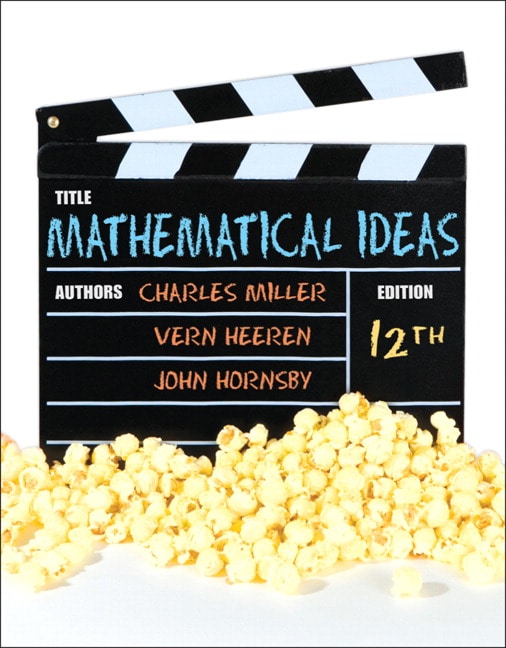
30.00$
Table of Contents
1. The Art of Problem Solving
1.1 Solving Problems by Inductive Reasoning
1.2 An Application of Inductive Reasoning: Number Patterns
1.3 Strategies for Problem Solving
1.4 Calculating, Estimating, and Reading Graphs
Extension: Using Writing to Learn about Mathematics
Collaborative Investigation: Discovering Patterns in Pascal's Triangle
Chapter 1 Test
2. The Basic Concepts of Set Theory
2.1 Symbols and Terminology
2.2 Venn Diagrams and Subsets
2.3 Set Operations and Cartesian Products
2.4 Surveys and Cardinal Numbers
Extension: Infinite Sets and Their Cardinalities
Collaborative Investigation: Surveying the Members of Your Class
Chapter 2 Test
3. Introduction to Logic
3.1 Statements and Quantifiers
3.2 Truth Tables and Equivalent Statements
3.3 The Conditional and Circuits
3.4 The Conditional and Related Statements
3.5 Analyzing Arguments with Euler Diagrams
Extension: Logic Problems and Sudoku
3.6 Analyzing Arguments with Truth Tables
Collaborative Investigation: Logic Problems and Sudoku Revisited
Chapter 3 Test
4. Numeration Systems
4.1 Historical Numeration Systems
4.2 More Historical Numeration Systems
4.3 Arithmetic in the Hindu-Arabic System
4.4 Conversion between Number Bases
Extension: Modular Systems
Collaborative Investigation: A Perpetual Calendar Algorithm
Chapter 4 Test
5. Number Theory
5.1 Prime and Composite Numbers
5.2 Large Prime Numbers
5.3 Selected Topics from Number Theory
5.4 Greatest Common Factor and Least Common Multiple
Extension: Modern Cryptography
5.5 The Fibonacci Sequence and the Golden Ratio
Collaborative Investigation: Investigating an Interesting Property of Number Squares
Chapter 5 Test
6. The Real Numbers and Their Representations
6.1 Real Numbers, Order, and Absolute Value
6.2 Operations, Properties, and Applications of Real Numbers
6.3 Rational Numbers and Decimal Representation
6.4 Irrational Numbers and Decimal Representation
6.5 Applications of Decimals and Percents
Extension: Complex Numbers
Collaborative Investigation: Budgeting to Buy a Car
Chapter 6 Test
7. The Basic Concepts of Algebra
7.1 Linear Equations
7.2 Applications of Linear Equations
7.3 Ratio, Proportion, and Variation
7.4 Linear Inequalities
7.5 Properties of Exponents and Scientific Notation
7.6 Polynomials and Factoring
7.7 Quadratic Equations and Applications
Extension: Complex Solutions of Quadratic Equations
Collaborative Investigation: How Does Your Walking Rate Compare to That of Olympic Race-walkers?
Chapter 7 Test
8. Graphs, Functions, and Systems of Equations and Inequalities
8.1 The Rectangular Coordinate System and Circles
8.2 Lines, Slope, and Average Rate of Change
8.3 Equations of Lines and Linear Models
8.4 An Introduction to Functions: Linear Functions, Applications, and Models
8.5 Quadratic Functions, Graphs, and Models
8.6 Exponential and Logarithmic Functions, Applications, and Models
8.7 Systems of Equations
8.8 Applications of Systems
Extension: Using Matrix Row Operations to Solve Systems
8.9 Linear Inequalities, Systems, and Linear Programming
Collaborative Investigation: Tracking an Epidemic
Chapter 8 Test
9. Geometry
9.1 Points, Lines, Planes, and Angles
9.2 Curves, Polygons, and Circles
Extension: Geometric Constructions
9.3 The Geometry of Triangles: Congruence, Similarity, and the Pythagorean Theorem
9.4 Perimeter, Area, and Circumference
9.5 Volume and Surface Area
9.6 Transformational Geometry
9.7 Non-Euclidean Geometry, Topology, and Networks
9.8 Chaos and Fractal Geometry
Collaborative Investigation: Generalizing the Angle Sum Concept
Chapter 9 Test
10. Counting Methods (formerly Chapter 11)
10.1 Counting by Systematic Listing
10.2 Using the Fundamental Counting Principle
10.3 Using Permutations and Combinations
10.4 Using Pascal's Triangle
Extension: Magic Squares
10.5 Counting Problems Involving "Not" and "Or"
Collaborative Investigation: Solving a Traveling Salesman Problem
Chapter 10 Test
11. Probability (formerly Chapter 12)
11.1 Basic Concepts
11.2 Events Involving "Not" and "Or"
11.3 Conditional Probability; Events Involving "And"
11.4 Binomial Probability
11.5 Expected Value
Extension: Estimating Probabilities by Simulation
Collaborative Investigation: Finding Empirical Values of
Chapter 11 Test
12. Statistics (formerly Chapter 13)
12.1 Visual Displays of Data
12.2 Measures of Central Tendency
12.3 Measures of Dispersion
12.4 Measures of Position
12.5 The Normal Distribution
Extension: Regression and Correlation
Collaborative Investigation: Combining Sets of Data
Chapter 12 Test
13. Personal Financial Management (formerly Chapter 14)
13.1 The Time Value of Money
13.2 Consumer Credit
13.3 Truth in Lending
13.4 The Costs and Advantages of Home Ownership
13.5 Financial Investments
Extension: Ponzi Schemes and Other Investment Frauds
Collaborative Investigation: To Buy or to Rent?
Chapter 13 Test
14. Trigonometry (formerly Ch. 10)
14.1 Angles and Their Measures
14.2 Trigonometric Functions of Angles
14.3 Trigonometric Identities
14.4 Right Triangles and Function Values
14.5 Applications of Right Triangles
14.6 The Laws of Sines and Cosines
Extension: Area Formulas for Triangles
Collaborative Investigation: Making a Point about Trigonometric Function Values
Chapter 14 Test
15. Graph Theory
15.1 Basic Concepts
15.2 Euler Circuits
15.3 Hamilton Circuits and Algorithms
15.4 Minimum Spanning Trees
Extension: Route Planning
Collaborative Investigation: Finding the Number of Edges in a Complete Graph
Chapter 15 Test
16. Voting and Apportionment
16.1 The Possibilities of Voting
16.2 The Impossibilities of Voting
16.3 The Possibilities of Apportionment
Extension: Two Additional Apportionment Methods
16.4 The Impossibilities of Apportionment
Collaborative Investigation: Favorites, An Election Exploration
Chapter 16 Test
Appendix: The Metric System
***THIS IS NOT THE ACTUAL BOOK. YOU ARE BUYING the Test Bank in e-version of the following book***
Mathematical Ideas, 12th Edition PDF Manual Solutions , PDF Mathematical Ideas, 12th Edition , Fast Download Mathematical Ideas, 12th Edition , Charles D. Miller, American River College Vern E. Heeren, American River College John Hornsby, University of New Orleans,Category : Higher Education

0 commentaires:
Enregistrer un commentaire